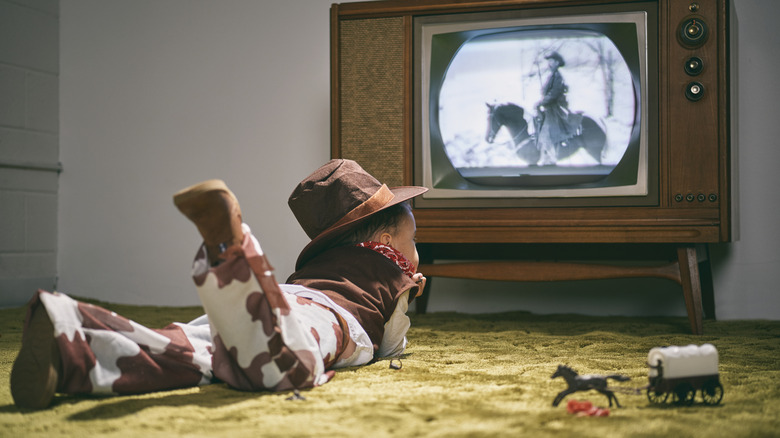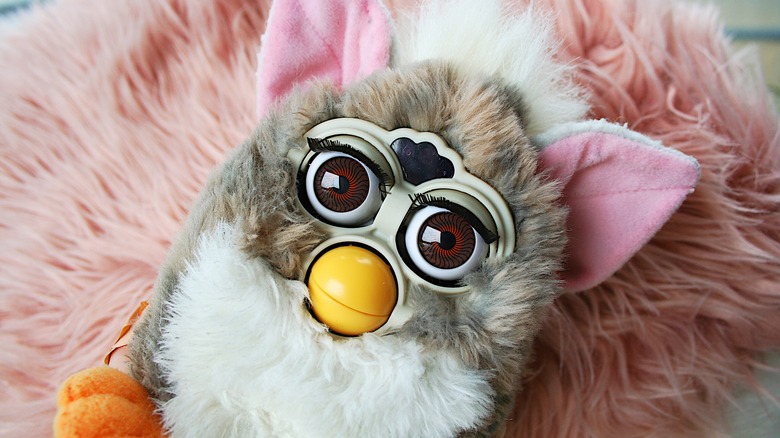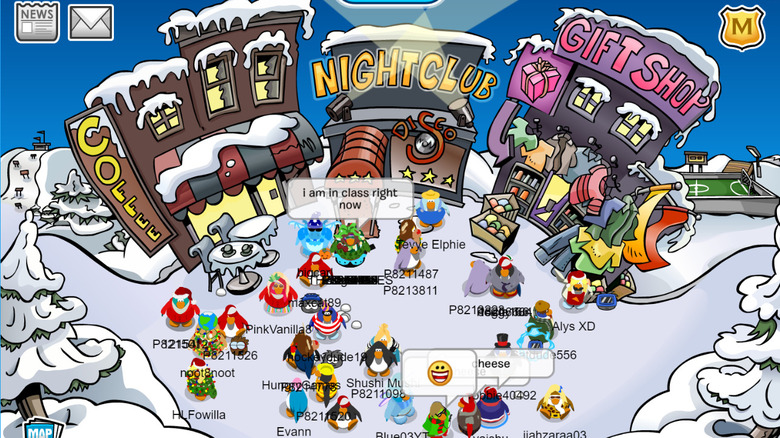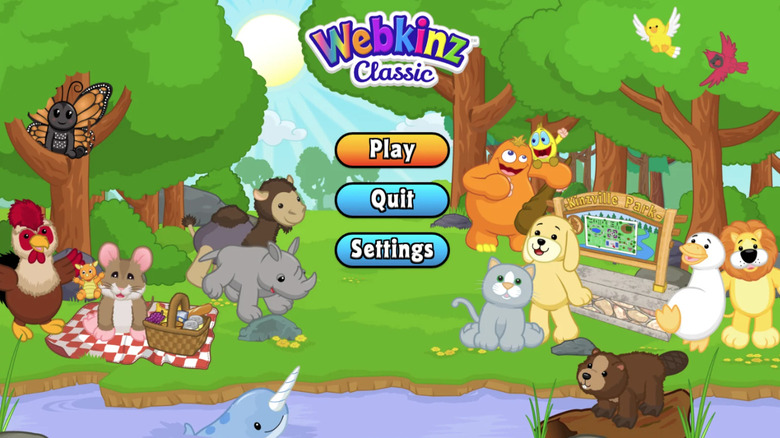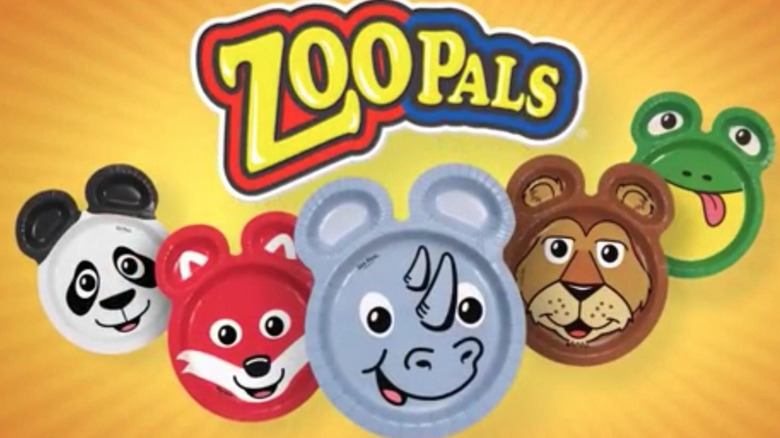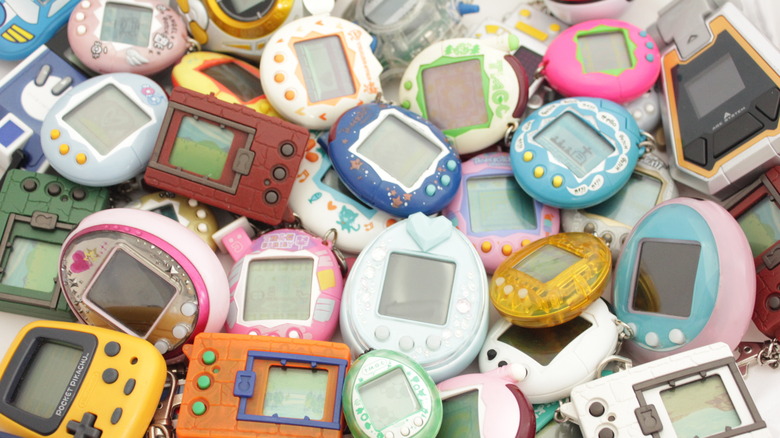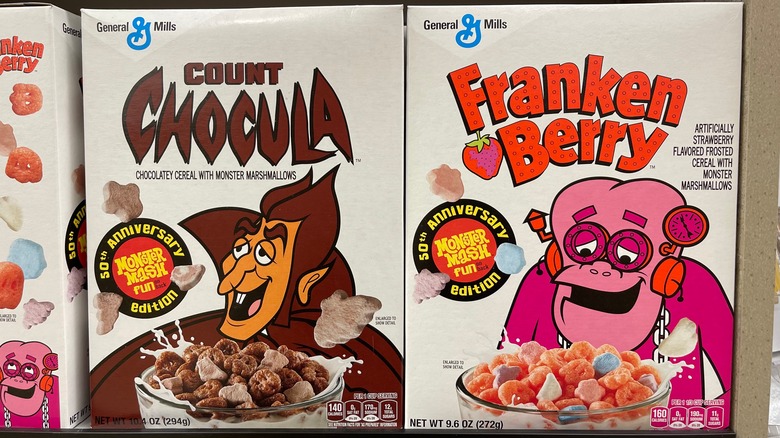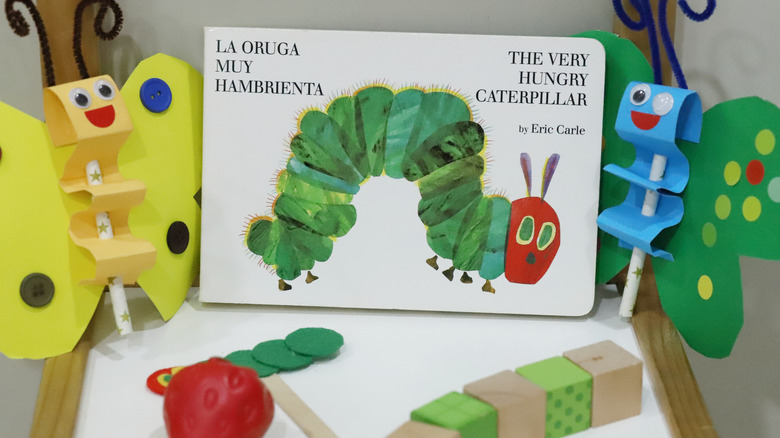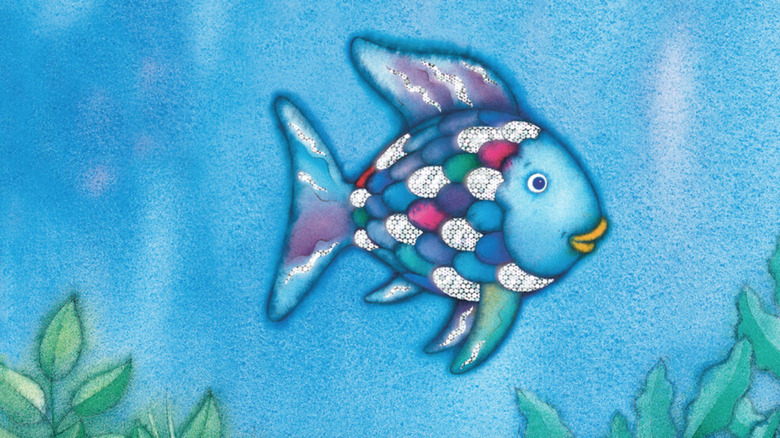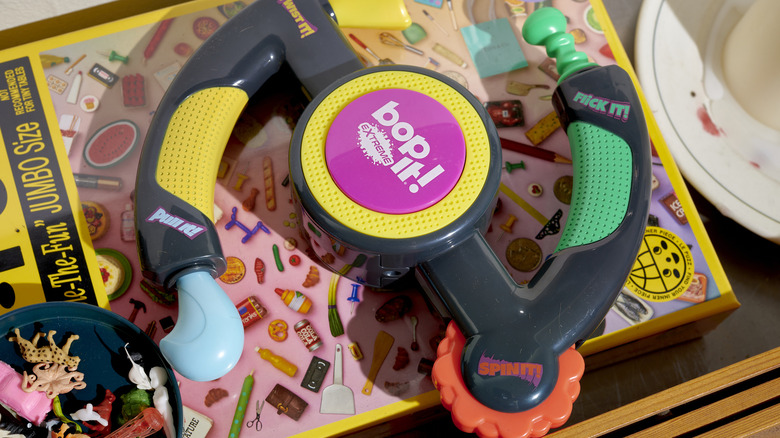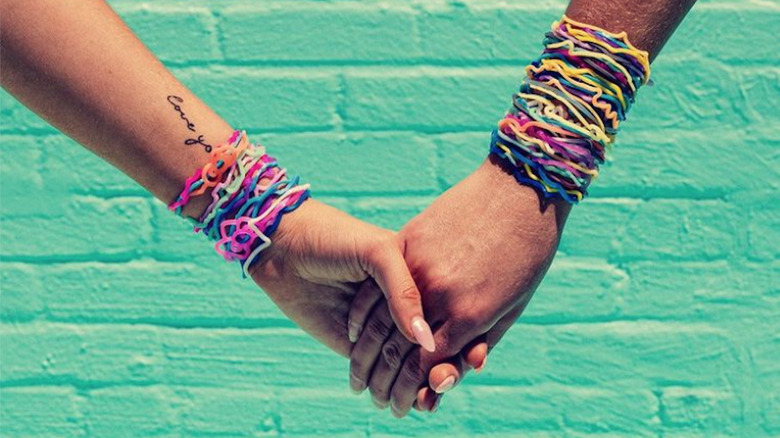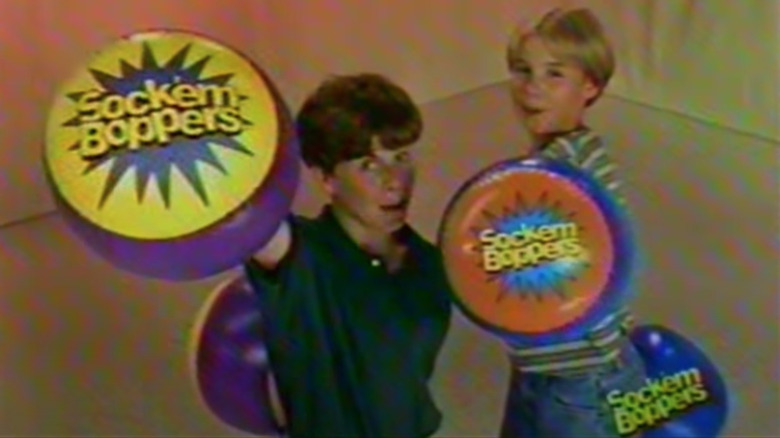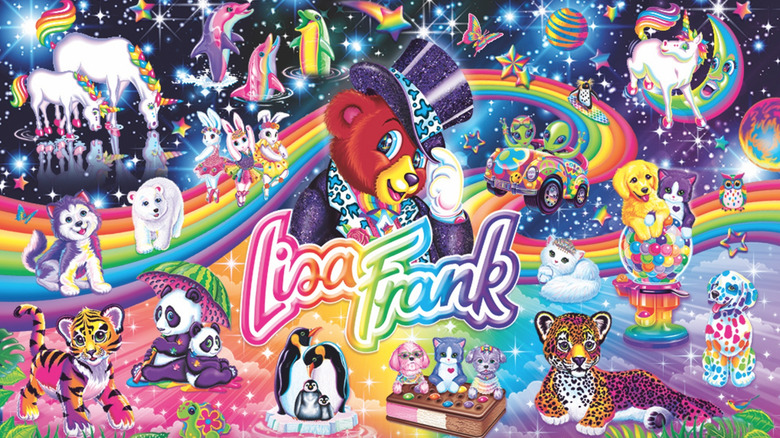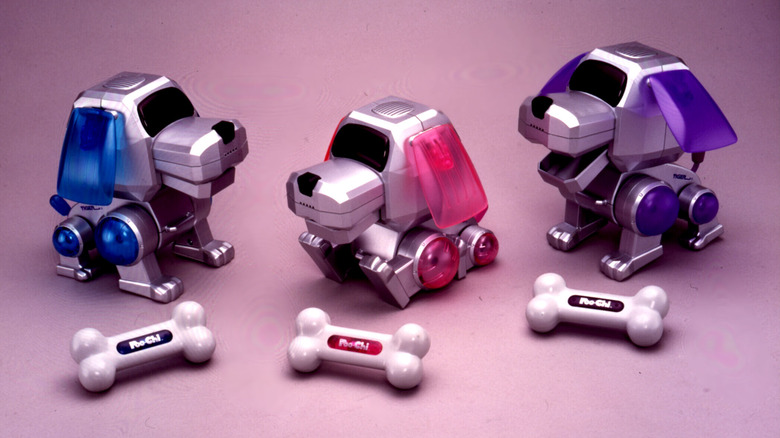Things From Our Childhood Hollywood Will Probably Make Into Films
We've seen the likes of Care Bears, My Little Pony, G.I. Joe, Legos, Trolls, and more make the transition from playthings to feature film stars over the years. Banking on audiences' nostalgia has proved to be a reliable business strategy for Hollywood thus far, so why stop now? With the success of films like "Transformers" and "Barbie," paired with Mattel's many toy-based movies in the works, there's never been a better time to cash in on this trend.
Now that you're climbing the corporate ladder and paying taxes, toy companies may have a harder time selling you the toys you used to play with in your youth. But a new opportunity has emerged to exploit your precious childhood memories by turning them into motion pictures for the whole family, and you better believe studios will leave no toy box unturned. Between all the soul-crushing stress and extensional dread that comes with adulthood, you'll have no choice but to fork over your hard-earned money for a chance to revisit a much simpler time in life — even if it's only for a couple of hours. Let go of the cynicism of adulthood and channel your inner child with these more-believable-than-you-would-think predictions of things from our childhood that Hollywood will probably make into films.
Furbys
Domestic robots infiltrated children's toy boxes in 1998 with the release of Hasbro's Tiger Electronics toy, the Furby. A fluff ball with large blinking eyes, a moving beak, and distinct fennec fox-like ears, Furbys possess equal qualities of cuteness and creepiness. Unlike anything else on the toy shelves, they became an instant must-have. The toy slowly fell out of favor as technology advanced at a rapid rate, leaving Furbys an artifact of the past. However, in recent years, internet users have gotten creative and reignited nostalgic interest in the toy with the creation of cursed "long Furbys" — a Furby with an extended, worm-like body.
Although most are valueless today, the memories of '90s kids everywhere remain invaluable, making the Furby a prime toy choice for the big screen. The Dimension Films production company thought so too, as in 2016, the studio announced the development of a live-action and CGI hybrid Furby movie. Owned by The Weinstein Company at the time, the project stalled and was eventually scrapped after co-founder Harvey Weinstein was fired and convicted of multiple counts of sexual assault. If Dimension Films' new parent company Lantern Entertainment ever wanted to revisit the project, we'd suggest a departure from Joe Dante's "Gremlins," starring Furby's distant cousin Gizmo.
If you or anyone you know has been a victim of sexual assault, help is available. Visit the Rape, Abuse & Incest National Network website or contact RAINN's National Helpline at 1-800-656-HOPE (4673).
Club Penguin
In 2005, the Internet generation — comprised of the late half of millennials and the early half of Generation Z — was introduced to one of the most successful massively multiplayer online games designed for children. By 2013, "Club Penguin" had amassed more than 200 million registered user accounts. In the virtual world of the game, users played as penguins with gameplay consisting of minigames, chatting, home and wardrobe customization, community parties, and other activities. The popularity of "Club Penguin" grew through word-of-mouth, and the sheer scope of the game's community set it apart from the competition. In 2007, the Walt Disney Company purchased the game for $350 million. The game continued to grow in popularity until a decline in 2015 and an ultimate shutdown in 2017. Fan-run sites popped up in the following years and gained substantial traction until they were also shut down due to copyright infringement.
Based on the success of "Club Penguin" recreations and users' continual requests for the game to make a comeback, its dedicated fanbase remains actively interested to this day. If Disney ever decided to give in to fans' pleas and reactivate the game, what better way to market its's return than a nostalgia-fueled movie? Penguins have already had mainstream success on the big screen with films like "Happy Feet" and "Penguins of Madagascar," and if done right, "Club Penguin" could blow both franchises out of the water.
Webkinz
The biggest "Club Penguin" competitor in the mid-to-late 2000s was the toys-to-life online game "Webkinz," where users could purchase stuffed animals accompanied by a code that would provide access to the animals' online counterparts within the virtual Webkinz World. Gameplay consists of arcade minigames, daily activities, home and wardrobe customization, and clubhouse chatting, among other things. Although changes have since been made to the site, Webkinz remains fully operational and even saw a spike in users during the COVID-19 pandemic as a result of past players revisiting the game out of nostalgia.
With such an expansive world and an extensive list of Webkinz plush pets to choose from, a potential film adaptation could easily spin off into a full-fledged Webkinz multiverse. Of course, the stars of these films would be none other than the game's most adopted and identifiable pets, such as the Golden Retriever, Polar Bear, Panda, and Reindeer. Speaking of the Reindeer, an obvious Christmas special would also be warranted alongside other seasonal pets.
Zoo Pals
Zoo Pals are more than just animal-shaped paper plates; they make eating fun while bringing back nostalgic memories for kids growing up in the 2000s, designed to hold one large portion and two smaller portions for dipping sauces or sides. Once you finish eating, you're met with a friendly animal face that'll put a smile on yours. If you tuned into any kids' TV networks in the 2000s, chances are you've come across the catchy jingle from the brand's iconic commercials. "Oink! Oink! Zoo Pals! Buzz! Buzz! Zoo Pals! Quack! Quack! Zoo Pals! Zoo Pals makes eating fun!" The jingle continues to include more animal sounds from the Hefty-owned line. If you don't automatically start harmonizing along while reading the lyrics, chances are this era of childhood nostalgia went right over your head, but that doesn't mean you shouldn't still buy tickets for the future smash hit, "Zoo Pals: The Movie."
A movie about paper plates? Don't be so quick to judge. There's nothing audiences love more than the anthropomorphism of animals. Just look at how many movies have dogs as the main characters! Why not extend that same practice to Zoo Pals? Perhaps the film could tackle the ethical considerations of animal captivity in zoos or raise awareness for environmental challenges and sustainability — after all, the animals didn't choose to be paper plates. These heavier themes would be approached in a fun, light-hearted way for the whole family in an attempt to rake in as many ticket sales as possible.
Tamagotchi
Combining handheld gaming with virtual pet companionship, Tamagotchi catered to a child's innate nurturing instinct and vast imagination like no other toy on the market during the late '90s and early 2000s. Originating in Japan in 1996 and making its way to the States months later, the pocket-sized, egg-shaped, two-in-one keychain and toy quickly became the newest toy fad everyone had to have. With simplistic graphics and design, Tamagotchis could be played by all age groups — and they were. Within a year of being released, 10 million Tamagotchi units were sold. The caretaking gameplay provided kids with a sense of responsibility to keep their pets happy and healthy. On the other hand, when a pet died after being neglected for a short period of time, it caused severe stress and grief, if only for a week or so.
Japan has already proved how successful a Tamagotchi film can be. In 2007, the Japanese animated film "Tamagotchi: The Movie" opened at number 3 at the box office. It was later dubbed in English in both Australia and the United Kingdom and even got a sequel, "Tamagotchi: Happiest Story in the Universe!" However, the States have yet to see the cutesy characters on the big screen. In the new age of toy-inspired, nostalgia-fueled films, Hollywood better act fast on this hot commodity.
Count Chocula
In 1971, General Mills introduced a seasonal monster cereal line that went on to become a household breakfast staple for generations of children. Various characters and flavors have come and gone throughout the years, but the one character who's stood the test of time and arguably represents the face of the line is Count Chocula — the chocolate, cereal-eating equivalent of the blood-sucking Dracula. One bite of his chocolate-flavored corn cereal with marshmallows will take you back to a time of memorable commercials and pack-in prizes.
With more than 50 years of commercial appearances and time spent on shelves, Count Chocula has the star power to lead Halloween's next big horror comedy. A reimagining of Bram Stoker's classic "Dracula," this could finally be Count Chocula's chance to become a fully fleshed-out character — backstory and all. As for the rest of the monster mascots, they'll eventually have their time to shine in potential spin-offs and sequels, of course.
The Very Hungry Caterpillar
"The Very Hungry Caterpillar" has been a children's picture book classic since its publication in 1969, selling more than 50 million copies worldwide. Written and illustrated by Eric Carle, the book follows a very hungry caterpillar as he eats his way through various foods until his final transformation into a butterfly. The story teaches children lessons about counting, the days of the week, metamorphosis, and healthy eating habits. If you were a kid with a nightly bedtime story session, "The Very Hungry Caterpillar" likely made its way into your rotation of reading material.
Although the book has been adapted into a UK television special and an Illuminated short film, the character has yet to make its feature-length debut, and it's only a matter of time before Hollywood takes advantage. Recognized and adored by generations of children dating all the way back to Baby Boomers, a "Very Hungry Caterpillar" movie would target a wide-ranging demographic. The story possibilities are endless given the simplistic source material. One can only imagine the kinds of adventures the Very Hungry Caterpillar could have on the big screen.
The Rainbow Fish
Another animal picture book classic that Hollywood won't be able to resist making into a feature-length movie is Marcus Pfister's "The Rainbow Fish." Published 23 years after "The Very Hungry Caterpillar" in 1992, '90s kids and their parents were instantly in awe of "The Rainbow Fish" and its unique illustrations, which use holographic foil for the fish's scales. The simple story about the inner joys of sharing with others is perfectly catered for preschool-aged children — although all ages could benefit from the lesson. Since its publication, the book has sold more than 30 million copies worldwide.
Like "The Very Hungry Caterpillar," "The Rainbow Fish" has been adapted into an animated television series and short film. There have also been multiple book sequels, all of which teach different life lessons from the perspective of the fish. At this point, more than enough material and public interest is out there for a film to be made about the selfless character. As long as the movie adopts the book's signature, standout artwork and wholesome story, Hollywood will undoubtedly have a hit on their hands.
Bop It
To keep up with Mattel's ambitious plans for future toy-based movies, rival toy company Hasbro had better quickly step up their game (literally). The ever-popular Bop It toy seems like a more than promising choice. Once a rite of passage for every overly competitive kid in the late '90s and 2000s, three simple commands have never caused more anxiety among a group of children as they'd race for the high score.
For those who missed out on the sharing lessons of "The Rainbow Fish," Solo Bop — the single-player game mode — was the go-to method of playing. There was always one person in a group of friends who insisted on repeating their turn, claiming they were so close to beating the high score. Meanwhile, everyone else would patiently look on, pretending to be intrigued by the robotic voice repeating "bop it" for the hundredth time, followed by an open hand smack that was always way too forceful for a plastic toy.
How does one make a movie about an audio-only toy that tests the reflexes of children? Apple TV's "Tetris" movie had no problem captivating audiences with a nostalgic origin story. Perhaps Hasbro could take a page out of that book. A simple concept with incongruously high stakes is all Bop It needs to make an impression on moviegoers.
Sillybandz
Middle schoolers in the 2010s transformed into hoarding collectors, bargaining merchants, and even thieves with the introduction and rising popularity of Silly Bandz. The rubber wristbands came in a wide range of shapes and colors, with themes such as dinosaurs, farm animals, the beach, and even the Kardashians. Certain collections were rarer than others, causing jealousy and competitiveness among kids. Soon enough, they became too much of a distraction in schools, and many started banning them altogether.
Although Silly Bandz are still around today, the craze has long worn off, no longer able to keep up with evolving trends and kids' ever-changing interests. But old trends come back in style all the time — just look to '90s and Y2K fashion or the success of 2023's "Barbie" movie. A dedicated Silly Bandz movie could be exactly what the brand needs to get back on everyone's radar. Nothing is off limits as far as Hollywood is concerned, so why not dramatize the legacy of sensationalized rubber bands?
Socker Boppers
The best way to appeal to young boys? Violence! When they're not simulating war in a video game or shooting each other with Nerf guns, they're finding another way to release their energy through general horseplay. Socker Boppers — formerly known as Sock'em Boppers — found a way to spice up playtime with its borderline-dangerous inflatable boxing glove design. At every family gathering, a child's mission was to actively avoid the cousin with unchecked anger issues wielding these puppies. Initially released in the 1970s, Socker Boppers have dipped in and out of popularity throughout the years, but they've yet to fully go out of style.
As far as movies go, Hollywood has the opportunity to make the next big sports drama franchise in the vein of "Rocky." Down on his luck, a professional Socker Bopper makes the comeback of the century in this inspiring and emotional blockbuster event. If someone doesn't get Sylvester Stallone on board quickly, Hollywood might miss out on bringing this riveting story to fruition.
Lisa Frank
Were you really a '90s kid if your school supplies weren't decked out in Lisa Frank's funky, whimsical, and colorful designs? The design company, founded by artist Lisa Frank, sold various stationary and activity products such as stickers, folders, pencil cases, coloring books, and notebooks featuring original characters, including Casey and Caymus the Golden Retrievers, Panda Painter, Hunter the Leopard, and others. Although production has since dwindled and products no longer fill store shelves like they used to, Frank's art style remains one-of-a-kind and in high demand. In 2021, the company experienced an Instagram-driven renaissance with the help of Frank's son, Forrest Green.
As one of the most recognizable childhood brands in the world, Lisa Frank needs to make the ultimate comeback with its very own movie. This was almost the case in 2017 when it was announced that a Lisa Frank live-action-meets-animation hybrid movie was in development. "I have always wanted to do a feature film that brings the world of Lisa Frank to life," Frank told Variety. "We have so much backstory on our characters and they have been alive in my imagination since the beginning." Unfortunately, there have been no updates on the movie's status since, but in our eyes, it's never too late.
Poo-Chi
One of the more niche childhood toys on this list is the Poo-Chi robot dog. Only on store shelves from 2000 to 2002, Poo-Chi is remembered fondly by a limited number of people who had the pleasure of adding the dog to their toy box during childhood. Manufactured by Sega Toys and distributed by Hasbro's Tiger Electronics, Poo-Chi utilized technology that was becoming more common among kids' toys at the time. Although this technology may seem limited by today's standards, the dog's main functions proved impressive at the time, including standing and laying down movements, changing LED display eyes, and barking sound effects. Poo-Chi was also a talented vocalist, barking along to various songs such as "Bingo," "Ode to Joy," and others.
Poo-Chi was far from the last robot dog ever to be made. In fact, in recent years, robot dogs have upgraded from kids' toys to crime-fighting canines working for police forces. It's a disturbing turn of events, to say the least. If only Hollywood could see the potential for a dystopian, post-apocalyptic sci-fi film about Poo-Chi's evolution, we might be able to get some form of entertainment out of the scenario before things ultimately go awry and robots take over.
